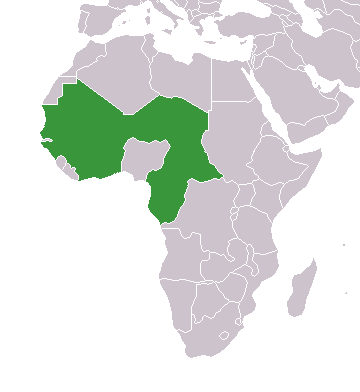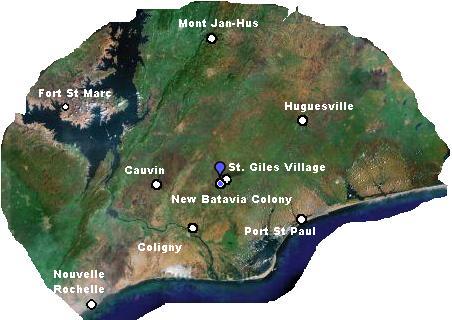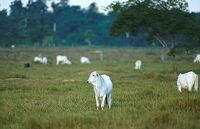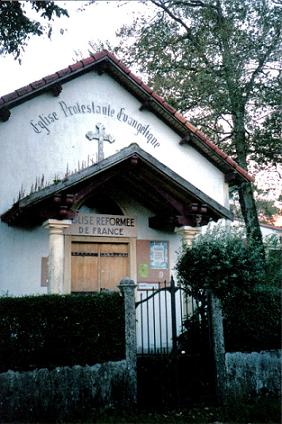| Flag (Official) | |
| Flags (Traditional Variants) | |
| Official Name | La République Royale des Calvinistes Déplacés |
| Capital | New Batavia Colony |
| Formation | 10/18/2006 |
| Alliance Affiliation | Christian Coalition of Countries (CCC) (Chancellor Nation) |
| Nation Team | Blue |
| Official Languages | French, English, Dutch, Ewe, Korean |
| Government | Monarchy |
| Head of State | Sheldomar Bolak - King of the Huguenots |
| National Anthem | Psalm 124, Now Israel May Say
Tune: "The Old 124th". |
| Religion | 99% Protestant Christianity, predominantly:
Reformed Church (74%), Presbyterianism (18%), Baptist (3%), Lutheranism (2%). The largest non-Christian religion is Judaism at just under 1% of the population. |
| Currency | The Central African Franc (CFA) |
| National Holidays |
|
| Statistics as of 12/10/2008 | |
| Infrastructure | 10,999.99 |
| Literacy Rate | 100% |
| Tax Rate | 30% |
| Tot. Area | 5,474.324 miles diameter |
| National Strength | 66,144.998 |
| Nation Rank | #649 of 29,056 Nations |
| Tot. Population | approx. 158,511 |
| Gross Income | CFA 479.68 |
| Natl. Resources | Cattle, Water |
| National Wonders |
|
Displaced Calvinists, officially, The Royal Republic of Displaced Calvinists (French, La République Royale des Calvinistes Déplacés) is a colonial nation in West Africa. It consists of the former French colonies of French West Africa and French Equatorial Africa.
The nation is a Protestant Christian theocracy. It was founded by a group of persecuted Calvinistic French Protestants belonging to the Reformed Church who were forced to flee their homeland. Starting as a tiny band of Huguenots, they migrated to West Africa and built a plantation colony with the goal of practicing their faith in peace. They were later joined by immigrants of Scottish, Korean, and Sudanese Presbyterian and Dutch Reformed backgrounds. The colony has grown to the point of inheriting all the territories of France's former West African holdings.
The unofficial national motto is, "The Belgic Confession Rocks!"
Nation Information[]
Displaced Calvinists is a sizable, well developed, and aging nation with citizens primarily of French ethnicity whose religion is Protestant Christianity.
Foreign and Domestic Policies[]
The Republic of Displaced Calvinists has emerged from being a tiny plantation colony into a sizable nation with a strong economy and technology. It believes that nuclear weapons are necessary for national defense and the security of its allies. The Republic's paramilitary police force, La Gendarmerie Nationale, has been positioned at all border crossings and is arresting all drug traffickers.
Displaced Calvinists allows its citizens to protest their government but uses a strong police force to monitor things and arrest lawbreakers. It has an open border policy, but in order for immigrants to remain in the country they will have to become citizens first. Displaced Calvinists believes in the freedom of speech and feels that it is every citizens right to speak freely about their government. The government gives whatever is necessary to help others out in times of crisis, even it means hurting its own economy. Displaced Calvinists will not make deals with another country that has a poor history of inhuman treatment of its citizens.
The Royal Republic of Displaced Calvinists is a Chancellor Emeritus Nation of the Christian Coalition of Countries (CCC) alliance.
Geography and Climate[]
Flat with occasional rolling hills in the south and east. Some low mountainous terrain in the north central districts. Weather is hot and fairly humid with frequent electrical storms along the coast and central plains. The middle northern regions are characterized by semi-arid grazing lands. The far norther regions include large sections of the Sahara.
The Republic of Displaced Calvinists shares borders with the nations of Ghana, the Republic of Axiom, Bikom, Mali, the Dominion of Mali, Benin, Ivoire, the Republic of Nigeria, the Congolese DR, Chad, The United Africa, UnitedStatesOfAfrica, and Burkina Faso. Notable nations that had one time existed as its neighbors include Sexlanta, Bix Nood, Cote Ivoire, and the mythical Afrilantis. To this date, the RDC has had peaceful relations with its immediate neighbors, and has publicly stated its desire to continue to contribute to peace in the region.
Located in West Africa along the Atlantic coast in the Gulf of Guinea, Displaced Calvinists has a tropical climate in the more populated regions. Annual rainfall along the coast is a minimum of 20 inches per year. There are two rainy seasons. The first is between April and June, followed by a relatively mild period between June and September. The second rainy season hits in September and October, with temperatures between 70 and 85 degrees, Fahrenheit. November through March is hot and dry, with temperatures reaching as high as 100 degrees. Farther north, the climate gradually becomes increasingly arid as the landscape extends into the southern reaches of the Sahara Desert.
Cities and Districts[]
- New Batavia Colony is the nation's largest city and the capital of the Republic. New Batavia Colony serves as the center for radio and print media, governmental administration, rail and bus transportation, education, automobile manufacturing, and French culture. Le Grand Temple de la Réforme, l'Arc du Roi Sheldomar, and the famed University of the Huguenots are located here.
Other notable settlements include:
- Coligny—Third largest town and the center of the nation's water bottling business and Beer industry. Home of the University of Coligny and the Coligny Stock Exchange. Located along the Volta River, southwest of New Batavia.
- Huguesville—hub for the Republic's cattle ranching and meat packing industries. Located northeast of the capital in the flatlands.
- Cauvin—the nation's largest chicken ranch home to Ferrel's Geneva Fried Chicken Fast Food franchise. Was at one time a center for the production of Steel.
- St Giles Village—suburb of the capital. Center for Scottish culture, the Knox Junior Hamburger restaurant chain, St Giles Presbyterian Hospital, and the nation's International Airport.
- Mont Jan-Hus—site of the Republic's international shortwave radio station, Radio RCD-2: Voice of the Huguenots. Located in the hill country north of New Batavia.
- Port Saint-Paul—Second largest town and major sea port, located along the coast on Cape Saint Paul. Location of the Olympic stadium, the Botswana International Friendship Arena. Home to the nation's largest Dutch and Korean communities.
- Nouvelle Rochelle—minor sea port and naval base.
- Fort Saint Marc—Gendarme military outpost and airstrip on Lake Volta.
- Kolozsvár—rural settlement of Hungarian Calvinists, a village suburb of Coligny.
The Republic of Displaced Calvinists is divided into five administrative Districts.
- Batavia Colony
- Huguesville District
- Coligny District
- Cauvin District
- St Paul Coastal District

Administrative Districts of the RDC, as drawn & colored by award-winning 3rd grade artist, Emile Roquefort
Government[]
Displaced Calvinists government is a Constitutional Republican Monarchy. Elected representatives under the authority of the King rule on behalf of the people. A parliamentary legislature consists of candidates from a variety of parties that represent the will of the people.

Original Colonial Flag
The Head of State is the King of the Republic, Sheldomar I, also known as Sheldomar Bolak, who is the former Colonial Governor-General. His official title is "King of the Huguenots."
The Parliamentary Legislature is called the Synod (formerly called the Classis, which now refers to town and district councils). The Synod consists of twenty-eight elected secular businessmen and twenty-one Protestant clergymen. Each member of the Synod serves a one year term. Rev. Ian MacKenzie serves as the Moderator of the Synod and is the Majority spokesman for the Democratic-Republic party. The spokesman for the Opposition is businessman Roland LeBlanc, founder of the Capitalism Now! movement.
The nation's Judicial system is based on Reformed Church canon law. A panel of Protestant ministers and church elders form a board called the Consistitory, which serves as the nation's court of law, and judges all cases. Rev. Pierre-Paul LeFevre is currently the Stated Clerk of the Consistitory.
Political Parties[]
Background
Political parties exist within a balance between the interests of the national churches, the royal family, and the will of the populace. Differing opinions in public affairs are still represented more by the various church denominations, and the political parties live under the shadow and influence of those religious bodies. The majority Reformed Church holds the sway of influence over the Republic, but the Presbyterian, Lutheran, Baptist, and Jewish populations also have a voice in matters. In this regard, the nation may be considered a populist theocracy, dominated by Calvinistic Christian thought.
As the nation's political process matures, most political organizations are learning how to work together under the authority of the Church and the King. The political parties of the Republic are centered around the pro-Republic church elders of New Batavia, Cauvin, and Mont Jan-Hus (led by the Reverend Ian MacKenzie), the pro-Democracy cattle ranchers of Huguesville (led by the Huguesville Cattlemens' Association), and the pro-Capitalist businessmen of Coligny and Port Saint-Paul (led by businessman Roland LeBlanc). Roland LeBlanc has organized his followers into the "Capitalism Now!" ("Capitalisme Maintenant!") movement. Other groups include a tiny Federalist party, and a dwindling French-supremacist pro-Dictatorship movement known as FIC (Francophone Ici, Copain!, known in English as the We Speak French Here, Buddy! movement.) The government has publicly denounced the FIC party, and has issued warrants for the arrest of its leaders after thwarting a coup attempt. The other major political parties are currently cooperating in a Monarchist coalition government.
With FIC's failed coup attempt thrusting it outside the realm of legitimate national politics, the only other serious political opposition to the Monarchy is the Bovineian Revolution, a Revolutionary political left-wing group founded by Hugo Vaches. The Bovineian Revolution seeks the overthrow of the Monarchy, and the establishment of either a Revolutionary, Communist, or Transitional government. The members of the Bovineian Revolution are mostly disaffected members of society, and are currently hiding out in the desert along the northeastern border.
List of Political Parties
Officially Recognized:
- The Royal Covenant Coalition
- Capitalisme Maintenant! (the Capitalism Now! Movement)
- The New Christian Federalists
- The Republican Eldership Party or REP
- The Huguesville Cattlemens' Association or AVH
- The Democratic-Republican Ticket (National coalition of REP and the Huguesville Cattlemens' Association).
Unrecognized Parties:
- Francophone Ici, Copain! or FIC
- The Bovineian Revolution.
Military[]
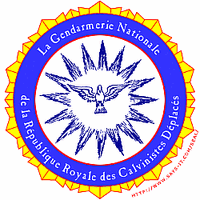
Public Safety Minister, Commandant-Major Yves Purdue is head of Displaced Calvinist's paramilitary police force, La Gendarmerie Nationale. State security, national defense, civic police work, disaster response, and search-and-rescue duties all fall under the umbrella of La Gendarmerie Nationale.
La Gendarmerie National has successfully completed a recent modernization program, upgrading their armament from a hodge-podge of mostly surplus equipment purchased from other nations over eBay into a modern, professionally equipped force. Units vary from lightly armed Rifle Brigades that patrol the cattle districts on horseback, to the highly sophisticated Mechanized Heavy Weapons Battalions that repulsed enemy units during the beachhead invasions of Great War V. River patrols are conducted by several specially armed military barges.
The Navy, known as La Marine Nationale, at last count, consists of 47 sea-going vessels ranging from air craft carriers to coastal patrol craft, in addition to numerous river patrol barges. The exact make up of La Marine Nationale is classified. The chief officer of La Marine Nationale is Admiral Édouard Sur le Mer. During Great War V, La Marine Nationale was noted both for extreme bravery, and for taking tremendous casualties.
Displaced Calvinists' Royal Republican Air Defense Corps is headquartered at the airfield in Fort St Marc. Details of its exact make-up have been withheld from the public, but it is known to be a mix of fighter and bomber aircraft, totaling 95 airplanes at last count. Military jet aircraft have been spotted flying on maneuvers between St. Giles Village and Huguesville on a regular basis. Some aircraft are assigned with the Marine Nationale as part of the Carrier Fleet, while others are stationed at the Foreign Air Force Base at the French Territory of Afars & Issas. The chief of staff of the RRADC is Général de l'Air Jean-Louis des Vents.
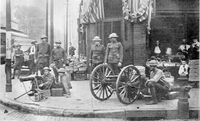
La Gendarmerie Nationale on alert after the Mid-Week Prayer Meeting Riots of Oct. 25th

Gendarme patrol barge on the Volta River
DSR: La Direction de la Securite et du Renseignement
The Royal Republic's intelligence and security needs are met by the DSR. La Direction de la Securite et du Renseignement is also known in English as the Directorate of Security and Intelligence, and is headed by Commandant Jacques-Pierre Mont-Fontainebleau. The DSR is committed to national security, anti-terrorism efforts, and counter-intelligence activities.
National SDI System: Project Ezekiel
The Nation of Displaced Calvinists is protected from potential nuclear attack by an extensive Strategic Defense Initiative system. This technological wonder goes by the code name Projet Ézéchiel (Project Ezekiel), and is rumored to be based in the Fort St Marc military reserve.
Economy[]
Displaced Calvinists' pro-business administration has provided a healthy atmosphere for thriving industrial ventures. International trade has vaulted this tiny plantation colony into a moderately successful and prosperous and growing nation.
Currency[]
Since its days as a plantation colony, the Republic has adopted the Central African Franc (CFA) as its unit of currency.
Natural Resources[]
The primary natural resources that form the base of the nation's economy are cattle and water. Cattle ranching is the largest industry in Displaced Calvinists, as evidenced by the large number of ranches dotting the mostly flat countryside. Bottling water from the famous Volta River in West Africa serves as a second major source of exportable income for the country.
Trade[]
Displaced Calvinists trade with a variety of international parters for goods such as aluminum, sugar, oil, wheat, lumber, fish, spices, iron, marble, and pigs.
Domestic Industries[]
Displaced Calvinists' thriving Fast Food industry has recently revived from near extinction, with Ferrel's Geneva Fried Chicken chain reopening, and causing Knox Junior Hamburger restaurants to spring up nationwide once again. Calvinist nostalgia is fond of the famous Trumpet-Blaster Burgers, Monstrous Regiment of Fries, and Iconoclastic Milkshakes. Their return to the national life is greatly welcomed by the Royal Republic's citizens.
In its former days of decline, the Fast Food industry had at one time been replaced by production in Steel, Asphalt, and Automobiles. The Bezamobile Roadster was, until recently, the favorite commercially available line of automobiles in West Africa, and many of them can still be seen on highways across the continent. The Construction industry continues to create a significant boost to the national economy.
The brewing industry produces beer for domestic consumption. Despite the nation's theocratic tendencies, the people are free to drink in moderation, and beer has become a popular commodity in some circles. Cheap, low-quality, mass-produced beer is outlawed, as it is seen as promoting drunkenness. The government enforces strict quality standards, forcing the brewing industry to craft finer quality ales and stouts. The Coligny Springs Brewery and the Port Saint-Paul Bottling Company are the most well-known domestic brands.
Displaced Calvinists' former research into the peaceful uses of atomic energy had at one time added a significant boost to the economy. This industry collapsed several months ago due to the sudden expiration of the nation's uranium trade agreement. The small atomic energy plant at New Batavia Colony has been shut down, and the burden of the Republic's electrical energy needs have been shifted over to the series of hydroelectric dams along the Volta River in the Coligny District. More recent imports of uranium have involved brief, individual shipments meant for use in the defense industry rather than the energy sector.

French Psalter published by the New Batavian Press
The nation's famous Bible printing house, New Batavian Press, produces Bibles, psalter-hymnals, and Protestant Christian literature in several languages for distribution world-wide. This particular venture is subsidized by the government directly, as it is not a profitable enterprise, but does provide employment for several dozen citizens. The Bibles are produced as a by-product of paper from the Timber trade and leather from the Cattle industry, and are noted for their high quality.
It is rumored that the government of the RRDC had at one time engaged in the practice of smuggling special pocket editions of their Bibles into countries where the book is restricted or banned. The RRDC has officially denied these allegations.
The Republic is also noted for its thriving Newspaper industry, showcased in the capital city's daily publication, The New Batavian Herald. Chronicling events in the Republic, the New Batavian Herald is published in French, English, and Dutch editions every day except Sunday. The paper is experimenting with publishing bi-weekly versions in Korean, Hungarian, and one or two local African dialects.
Failed Ventures[]
Other attempted businesses, such as starting coffee plantations and salt mines, have proved to be less financially rewarding, causing these failed industries to shut down as resources are diverted toward more profitable ventures.
Religion[]
Protestant Christianity[]
Having been founded as a colony of refuge for persecuted Huguenots (French Calvinistic Protestant Christians), Displaced Calvinists' major and official religion is the Reformed Church. The Belgic Confession and the Heidelberg Catechism are actually placed in an appendix on the end of the nation's constitution. The Reformed Church is the heart and soul of the Republic, making up 74% of the population between its French, African, and Dutch members. The citizens of Displaced Calvinists, having been persecuted for their beliefs and driven from their homelands, tend to hold their faith in high regard in both their personal and public lives.
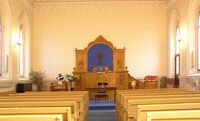
Presbyterian Chapel in Coligny
Presbyterianism, which is almost indistinguishable from the Reformed Church, makes up an additional 18% of the population. Both the Reformed Church and the Presbyterian Church are Calvinistic, can trace their roots directly back to the reformer John Calvin, and have a presbyterian form of church government (similar to a republic where elected elders oversee the church.) The major differences are that the Presbyterian Church is from an English-speaking background, is more influenced by John Knox's Book of Church Order, and adheres to the Westminster Confession of Faith rather than the Reformed Church's Belgic Confession. For all intents and purposes, the government treats the Presbyterian church the same as the Reformed Church in its status as the official state religion. Together, they make up 92% of the Republic's populace.
Freedom for Protestants is guaranteed under law. Other major Protestant traditions, such as Lutheranism and Baptists, are given equal standing along side the majority state-sanctioned Reformed and Presbyterian churches. The majority of these Christians are also from a French background, and are also considered to be Huguenots. Together, these two minority groups make up 5% of the nation's people.
Other Protestant groups worth mentioning include the Calvinistic Methodists and the Anglican Communion of North Africa, both estimated at around 1% of the population each. The nation's Anglicans are mostly Arab-Berber Christians who relocated after escaping persecution in neighboring Libya. The Methodist church was founded by missionaries from North America, and has members belonging to most of the Republic's major ethnic groups.
Altogether, the nation is 99% Protestant Christian, broken down into the following groups:
French, African, Dutch, and Hungarian Reformed Church (74%) Scottish, Korean, and Dinka Presbyterian Churches (18%) French Calvinist Baptist Union (3%) The Brotherhood of French & African Lutherans (2%) Anglican Communion of North Africa (1%) Association of Calvinistic Methodists (1%).
Officially, there is a broad tolerance provided for non-Christian religions, particularly Judaism.
Judaism[]
The largest non-Christian religion is Judaism at less than 1% of the population.
There is a unique relationship between the Christians and Jews of Displaced Calvinists. By law, the Jews are required to observe the Jewish sabbath (sunset Friday to sunset Saturday), while Christians are required to observe Sunday as an official Day of Rest. While the majority Christian population is observing their Day of Rest, the Jewish working population keeps the infrastructure of the nation running, holding important positions in the military, public safety, police, and health-care industries. Most of the Jewish population of Displaced Calvinists migrated as part of the hired military-police protection for the colony at the invitation of the Public Safety Minister, Yves Purdue. A recent influx of additional French Protestant immigrants into the nation has reduced the percentage of Jews from 2% to 0.74% of the population, even though their actual numbers have remained relatively steady.
Other Religions[]
Other religions, mostly followers of Islam and Indigenous Animists following a religion closely related to Voodoo, comprise less than 1% of the population total. Estimates are 0.2% Animism-Voodoo and 0.15% Muslim. This figure has been in a steady decline. As of the first of October 2007, it was estimated there were 110 Muslims and 146 Animists remaining in the Royal Republic. This decline in numbers reflects the influence of the nation's Great Temple, plus the emigration of non-Christians to neighboring countries, and evangelism efforts by the nation's Baptist community.
The dwindling Islamic and Animist minorities are made up of the local native population who have attached themselves to some of the outlying ranches and plantations as ranch hands, particularly in the Huguesville District. While efforts have been made to convert them to Protestant Christianity, there is no penalty or discrimination for those who do not wish to become Christians. Nearly 95% the native Ewe population has converted to Christianity, and have become members of either the French Reformed, Lutheran, Presbyterian, or Baptist churches.
The French Calvinist Baptist Union is actively attempting to evangelize the non-Christian remnant of the Ewe population. This evangelization effort has been met with mixed results ranging from eager acceptance to violent opposition. Earlier this year, the headquarters of the French Calvinist Baptist Union and the capital's Ewe Cultural Center were burned down during a riot protesting the Baptists' evangelical campaign. The government has rebuilt both structures.
People[]
Nearly 84% of the nation's inhabitants are colonists and immigrants from an European background (predominantly French). Groups of the indigenous Ewe, Mossi, and other West African people groups reside mostly in the countryside, while a handful of Korean Presbyterians have immigrated from North Korea, settling in the cities. A group of displaced Presbyterian Christians from the East African Dinka tribe have arrived as refugees from Sudan, and are being settled in the Huguesville rural cattle districts. Several families of Hungarian Reformed Christians have relocated from Cluj, Romania to the village of Kolozsvár in the Coligny District.
The ethnic and regional origins of the Royal Republic's inhabitants are broken down as follows:
65% French 15% British Isles and North America 13% Ewe, Mossi, Wolof, and other native African groups 3% Dutch 1% Korean 1% Dinka (East African refugees from Sudan) 1% Arab-Berber 0.4% Hungarian (from Cluj, Romania) 0.6% Other
Culture and Media[]
Much of the culture of Displaced Calvinists has been imported from the native lands of its inhabitants, and is currently dominated by a middle class, French Protestant world-view. Freedom of religion for Protestants, the Bible and psalm-singing play prominent roles in the national psyche. This national dedication to classical Protestantism is enshrined in the National Wonder, Le Grand Temple de la Réforme (the Great Church of the Protestant Reformation).
Media consists of the national daily newspaper, The New Batavian Herald, and the country's state-owned AM radio station network (Radio RCD-1). A Bible publishing house, New Batavia Press, produces written materials for both domestic use and for distribution overseas.
An international short-wave radio station, Voice of the Huguenots (Radio RCD-2) broadcasts programs world-wide as a cooperative effort between the government and the Republic's French Reformed congregations. A privately owned network of commercial FM radio stations is operating under the financing of businessman Roland LeBlanc in most major cities. This network is officially called Radio RCD-3, but is commonly referred to as Radio-Roland.
Internet access is provided by a variety of methods: high speed cable, satellite, and in some outlying regions, dial-up. Internet cafés are found in nearly every population center. The Internet country code for Displaced Calvinists is .rcd.
Television broadcasting within Displaced Calvinists is under a royal moratorium issued by the King himself. The current parliamentary government has stood behind this moratorium, and it is not expected to be lifted soon. Royal officials have claimed that television broadcasting has adverse effects on society, culture, and child development. Television ownership by private citizens is not banned, as they are commonly used to watch movies and educational videos. Citizens living in the border regions may occasionally receive television signals from neighboring countries. The watching of foreign television broadcasts is unregulated by the government, and is left to the discretion of the few citizens who are able to receive the signals.
A series of national Stadiums host the country's sports interests, including croquet, lawn bowling, football (soccer), lacrosse, and rodeo events. Competition croquet is the most popular sport in the urban centers, while rodeo has become popular in the rural cattle districts. Most famous of these stadiums is the John Calvin Memorial Stadium in New Batavia Colony, and the Botswana International Friendship Arena (also known as the BotswanaDome, as it was built as a gift from the nation of Botswana) in Port St Paul. The arenas are closed to sporting events on Sundays, when they are used to host religious services. Regional preaching competitions and Christian conferences are also major stadium events within the Royal Republic.
History[]
The Region Prior to 2005[]
Named the Gold Coast by early European explorers, the area originally settled as New Batavia Colony and Displaced Calvinists was ruled as the German colony of Togoland between 1884 and 1914. During World War I (1914 - 1918), combined French and British forces invaded, and split Togoland between them. After World War I, the territory between the east bank of the Volta River and the Togo border was granted to displaced French Huguenots and Scottish Covenanters to serve as a religious haven for persecuted Calvinists. The first plantation for these religious refugees was New Batavia Colony. The colony was overseen as a cooperative effort of the French and British governments from 1922 to 1955 (French administered, but existing on British territory). By 1956, the colony had grown considerably, and had been granted autonomous self-governance of the entire territory of French West Africa and Ghana's Volta District. This grant was extended to include all of French Equatorial Africa in 1960. In 1961, management of the Central African Franc as a unit of currency was transfered to First Huguenot Bank in the city of Coligny. The French government operated New Batavia as an autonomous overseas department until the colony gained full independence from both France (in 2005) and the United Kingdom (in 2006).

Colonial Settlement along the Volta River
New Batavia Colony becomes the RRDC[]
For the first year of full independence, the plantation settlement of New Batavia Colony and the Republic of Displaced Calvinists were managed as identical entities, with the same government for both the town and the nation. However, as the Republic began to mature, the extended national boundaries proved to be far beyond what the colonial city Classis Council could effectively govern. Plans to separate the government of the nation from that of its capital city had not gone along as quickly as the outlying areas had hoped. This became a source of tension between New Batavia Colony and the other towns within the Republic, especially Huguesville, where the local Cattlemen's Association had gone so far as to take up arms to demand fairer representation. Negotiations between the Cattlemen and the government led to the breakup of the original Colonial Classis Council, and the formation of a Democratic-Republic in its place.
When the Capitalism Now! movement began winning enough seats to take control of the parliamentary Synod, the Democratic cattlemen and the Republic townsfolk joined forces in a coalition government to regain control. Recently, with the rise of the pro-Dictatorship FIC party threatening the Republic from within, the Democratic-Republic coalition joined with the Capitalism Now! movement along with the fledgling Federalist party to establish a Monarchy. Colonial Governor-General Bolak was proclaimed King Sheldomar I in an effort to consolidate the nation's power base and protect it from the growing fascist FIC movement.
With Pierre Bon-Marche's FIC movement losing momentum in the nation's cities, the Monarchy has enjoyed tremendous popularity through most of the nation. However, the farthest frontier regions have seen the emergence of a new Radical Revolutionary movement under the leadership of Hugo Vaches. Hugo Vaches has publicly stated that his aim is the overthrow of the Monarchy, and is currently wanted by the Gendarme authorities for questioning. It is suspected that he is receiving funding from Jean Bruchard-Cleuseau in his anti-Calvinist activities.
For further details, please refer to the articles New Batavia Colony and the personal history of Sheldomar Bolak. Please also view the Current Events below.
Current Events[]
Straight from the Headlines of the New Batavian Herald !
BREAKING NEWS:
Project Ezekiel SDI System Activated![]
Strategic Defense Initiative, code named Project Ezekiel, activated... OTS, CROWN, withdraw from KnoC bloc... Recession worries calmed... 8th Legion stationed overseas....
Jan. 27, 2008
- Fort St Marc: Our Royal Republic is now an even safer place to live! Projet Ézéchiel (known in English as Project Ezekiel), our national Strategic Defense System, was activated at midnight last night. Citizens report seeing a brief flash of blue and green laser lights forming a grid over the night sky as the system came online. Our Royal Republic is now defended against possible attacks from Nuclear Weapons. Should we ever be attacked with atomic missiles, there is now a 60% chance that they will be destroyed in the upper atmosphere and never reach their target.
- New Batavia Colony: Our bloc, The Knights of Christ, has suffered its first setback with the withdrawal of CROWN and OTS from the pact. The remaining bloc members, THC, CCC, and LUA have renewed their pledge to support and defend each other. King Sheldomar assured the remaining alliances of the CCC's commitment to remain a member of KnoC, "I am certainly for our bloc continuing, and fully support our continued cooperation together in The Knights of Christ."
- Coligny: An economic recession looming over our nation was averted when the board of First Huguenot Bank reduced interest rates over the weekend. The national happiness index shot up two points as a result of this news.
- Nouvelle Rochelle: The 8th Legion of Gendarme Rifles could be heard singing Psalm 68 from the deck of the troop ship le Camisard as they sailed out of Nouvelle Rochelle harbor just before midnight last Wednesday night. Their destination? The Texas Christian Rep. Their mission? Restore order and protect our fellow alliance ally from the unwarranted aggressions of a mad dictator. Our brave Gendarme Legionaries have been sent overseas as part of an emergency deployment to restore order in the Texas Christian Republic, which suffered a series of unprovoked attacks from the nation of Parincea, and descended into Anarchy as a result. Our Royal Republic responded by sending 3 million Central African Francs in aid in addition to the 2,000 Gendarme soldiers of the 8th Legion. Paylnn, the ruler of the Dictatorship of Parincea, was ordered by his alliance, the Crescent Moon Republic, to cease his unauthorized war, declare peace, and pay reparations—or face the consequences.
Internet a Hit with Calvinists[]
Government establishes Internet access nationwide.... Cybercafés, web sites spring up overnight... The ".rcd" era begins....
Dec. 28, 2007

Satellite internet coverage in the RRDC
- The government announced today that Internet access has been established nation-wide across our Royal Republic. A mixture of satellite internet and dial-up services are available in most rural areas, while high speed cable is now available in every major city and town. The reaction has been mostly positive. Church leaders and captains of industry have both embraced this new media with enthusiasm. "I can now sell my Volta River Bottled Water directly to the public world-wide!" exclaimed an ecstatic Roland LeBlanc. Meanwhile, Rev. George Irving of Presbyterian World Relief stated, "We can now communicate with our aid workers out in the field more efficiently through e-mail, as well as keep our supporters informed of the latest needs."
- King Sheldomar announced with the establishment of Internet service, our nation's new country code for internet web pages: .rcd (standing for République des Calvinistes Déplacés). Meanwhile, cybercafés have sprung up across the Royal Republic in just about every city and town. Smiling faces abound as the public flocks to these newly opened cafés and marvels at being able to view the King's web page. With a wide grin of his own, New Batavia Colony's mayor, Benoît du Lyons promised, "We should have the rest of the 'net available for viewing within a day or so." Pollsters report the public ARRJAE ("Approval Rating Regarding Just About Everything") shot up a full five points overnight, giving the economy a huge boost as a result.
For past news stories, see the Archives of The New Batavian Herald.



